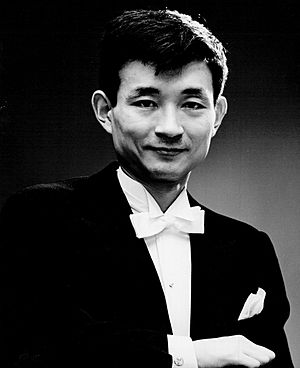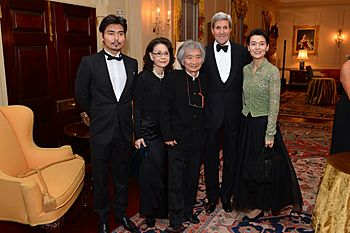Seiji Ozawa facts for kids
Quick facts for kids
Seiji Ozawa
|
|
|---|---|

Ozawa in 1963
|
|
| Born | September 1, 1935 |
| Died | February 6, 2024 (aged 88) |
| Occupation | Conductor |
| Children | Yukiyoshi Ozawa (son) |
| Relatives | Kenji Ozawa (nephew) |
Seiji Ozawa (小澤 征爾, Ozawa Seiji, September 1, 1935 – February 6, 2024) was a famous Japanese conductor. He was known for supporting modern music and for leading many big orchestras. These included the San Francisco Symphony Orchestra, the Toronto Symphony Orchestra, the Vienna State Opera, and the Boston Symphony Orchestra. He was the music director for the Boston Symphony for 29 years, which is a very long time! He won many international awards. In 2002, he became the first Japanese person to conduct the famous Vienna New Year's Concert.
Contents
Early Life and Musical Beginnings
Ozawa was born on September 1, 1935, in Mukden, a city in China that was occupied by Japan at the time. His family moved back to Japan in 1944. There, he started learning to play the piano with a teacher named Noboru Toyomasu. He spent a lot of time studying the music of Johann Sebastian Bach.
In 1950, after finishing Seijo Junior High School, Ozawa broke two fingers while playing rugby. Because he could no longer play the piano, his teacher at the Toho Gakuen School of Music, Hideo Saito, took him to a special concert. They heard Beethoven's Piano Concerto No. 5. This experience changed Ozawa's life and made him want to become a conductor instead of a piano player. He graduated from the Toho Gakuen School of Music in 1957.
Achieving International Success
About ten years after his rugby injury, Ozawa won first prize at a big music contest in France called the International Besançon Competition for Young Conductors. This win led to an invitation from Charles Münch, who was the music director of the Boston Symphony Orchestra. Munch invited Ozawa to study at the Berkshire Music Center (now called the Tanglewood Music Center). There, Ozawa learned from Munch and another famous conductor, Pierre Monteux.
In 1960, soon after he arrived, Ozawa won the Koussevitzky Prize. This was the highest award for student conductors at Tanglewood. He then received a scholarship to study with the famous Austrian conductor Herbert von Karajan. Ozawa moved to West Berlin to learn from Karajan. While studying there, another important conductor, Leonard Bernstein, noticed him. Bernstein then hired Ozawa as an assistant conductor for the New York Philharmonic. He worked with them during the 1961–1962 and 1964–1965 seasons. During this time, he also performed his first professional concert with the San Francisco Symphony Orchestra in 1962. Ozawa is the only conductor who studied with both Karajan and Bernstein.
In December 1962, Ozawa had a disagreement with the famous Japanese NHK Symphony Orchestra. Some of the musicians did not like his conducting style. Ozawa then chose to conduct the rival Japan Philharmonic Orchestra instead. From 1964 to 1968, Ozawa was the first music director of the Ravinia Festival. This is where the Chicago Symphony Orchestra plays in the summer. In 1969, he became the festival's main conductor.
Ozawa was the music director for the Toronto Symphony Orchestra from 1965 to 1969. He then led the San Francisco Symphony from 1970 to 1977. In 1972, he helped the San Francisco Symphony make their first recordings in ten years. They recorded music inspired by William Shakespeare's Romeo and Juliet. In 1973, he took the San Francisco orchestra on a tour of Europe. One concert in Paris was even broadcast live to San Francisco!
Leading the Boston Symphony Orchestra

Ozawa became the music director of the Boston Symphony Orchestra (BSO) in 1973. He stayed with the BSO for 29 years, which is the longest time any music director has led that orchestra. He was there even longer than Serge Koussevitzky, who led for 25 years.
Ozawa won his first Emmy Award in 1976 for the BSO's TV show, Evening at Symphony. In 1994, the BSO named their new concert hall at Tanglewood "Seiji Ozawa Hall" to celebrate his 20th year with the orchestra. He won his second Emmy in 1994 for a program called Dvořák in Prague: A Celebration.
In December 1979, Ozawa conducted a very important performance of Beethoven's Ninth Symphony in China. This was the first time this symphony was played live in China since 1961, because Western music had been banned.
Ozawa also helped create the Saito Kinen Orchestra in 1992 with Kazuyoshi Akiyama. Their goal was to bring together Japanese and international musicians. This orchestra has become very well-known around the world.
In 1998, Ozawa conducted a special performance of Beethoven's "Ode to Joy" at the opening ceremony of the 1998 Winter Olympics in Nagano, Japan. Ozawa led an orchestra and singers in Nagano. They were joined by choirs singing from cities all over the world, like Beijing, Berlin, New York City, and Sydney. This was the first time such a big international musical performance had happened at the same time.
Ozawa really supported 20th-century classical music. He helped many new pieces of music be performed for the first time. He was also known for his unique conducting clothes. Instead of a usual formal shirt and tie, he often wore a white turtleneck with his formal suit.
In 2001, the Japanese government honored Ozawa as a Person of Cultural Merit.
Later Years and Health Challenges
In 2002, Ozawa left his role as music director of the BSO. He then became the main conductor of the Vienna State Opera in Austria. He also continued to be an important teacher at the Tanglewood Music Center, which helps young musicians. On New Year's Day 2002, Ozawa conducted the famous Vienna New Year's Concert. In 2005, he started a group called Tokyo Opera Nomori.
In 2006, Ozawa had to cancel all his concerts because he was sick with pneumonia and shingles. He returned to conducting in March 2007. Ozawa left his job at the Vienna State Opera in 2010.
In October 2008, Japan honored Ozawa with the Order of Culture. This is a very high award. He also received other awards, like the Suntory Music Award and the International Center in New York's Award of Excellence.
On January 7, 2010, Ozawa announced that he needed to take six months off to get treatment for esophageal cancer. Doctors said the cancer was found early. He also had other health issues, like pneumonia and back surgery. After his cancer diagnosis, Ozawa had many conversations about classical music with the famous writer Haruki Murakami. These talks became a book called Absolutely on Music.
Ozawa passed away from heart failure at his home in Tokyo on February 6, 2024. He was 88 years old.
Awards and Honors
- 1959: International Competition of Orchestra Conductors, Besançon, France
- 1960: Koussevitzky Prize for Outstanding Student Conductor, Tanglewood
- 1976: Emmy Award for Evening at Symphony
- 1981: Grammy Award for "Best solo instrument performance with orchestra"
- 1992: Hans von Bülow Medal (given by the Berlin Philharmonic)
- 1994: Emmy for Dvořák in Prague
- 1994: Inauguration of Seiji Ozawa Hall at Tanglewood
- 1997: Musician of the Year (Musical America)
- 1998: Conducted Beethoven's Ode to Joy at Nagano Winter Olympics opening ceremony
- 1998: Chevalier of the Légion d'honneur (France)
- 2001: Member of the Académie des Beaux-Arts of the Institut de France
- 2001: Person of Cultural Merit, Japan
- 2002: Austrian Cross of Honour for Science and Art, 1st class
- 2008: Order of Culture, Japan
- 2011: Praemium Imperiale, Japan
- 2011: Order of Friendship (Russia)
- 2015: Kennedy Center Honoree
- 2016: Grammy Award for Best Opera Recording
- 2016: Honorary Member of the Berlin Philharmonic
Personal Life
Seiji Ozawa had three brothers: Katsumi, Toshio, and Mikio. Mikio became a music writer and radio host. Ozawa was married to Miki Irie, who was a model and actress. She was part Russian and part Japanese. Before that, he was married to pianist Kyoko Edo. Ozawa and Miki Irie had two children, a daughter named Seira and a son named Yukiyoshi. While he was with the Boston Symphony Orchestra, Ozawa chose to split his time between Boston and Tokyo. He and his wife wanted their children to grow up knowing about their Japanese heritage.
Ozawa and the famous cellist and conductor Mstislav Rostropovich formed a traveling music group. They gave free concerts and taught students across Japan.
Images for kids
-
Ozawa (center) and his family with U.S. Secretary of State John Kerry at the 2015 Kennedy Centers Honor dinner in Washington, D.C.
See also
 In Spanish: Seiji Ozawa para niños
In Spanish: Seiji Ozawa para niños
 | Frances Mary Albrier |
 | Whitney Young |
 | Muhammad Ali |


